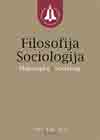Polibijus: apie valstybės kilmę ir dinamišką jos formų morfologiją
Polybius on the origin of the state and the dynamic morphology of its forms
Author(s): Dalia EidukienėSubject(s): History
Published by: Lietuvos mokslų akademijos leidykla
Keywords: universal history; politics; statehood; political relations; form of the state; cycles of government; mixed constitution
Summary/Abstract: This article deals with the political ideas of Polybius (c. 205 BC – c. 128 BC), a Greek historian and statesman and the author of The Histories, a collection of forty books. He does not retell historical events but presents them against the universal backdrop of the ancient world, without breaking them up into the local histories of individual states. Polybius’ political ideas were influenced by the political doctrines of Plato, Aristotle and the Stoics. However, Polybius sought to come up with his own interpretation of his times, which were creating qualitatively new political realities that made it possible for Rome to conquer so many lands and bring them under its absolute power in such a short period of time, i. e. in less than fifty-three years. He constantly repeats that not only did the tangle of events in his day become more apparent, but that it also began to exert a global influence on the historical process. This factor dictated a new perception and interpretation of events. This is why Polybius attempted to encompass the development of the whole ancient world of his time and to relate it to contemporary political processes in the Mediterranean region. He understood that in the future the Mediterranean world would be under Roman rule and therefore thought that it was very important not only to show the superiority of Roman statecraft, but also to present it in the overall context of the Greek political literature and to demonstrate the universal nature of the ancient world. Even though Polybius emphasizes that in order to understand historical events correctly one must be able to analyse the relationship between cause and effect, he pays particular attention to the problem of fate. To Polybius, the concept of fate is synonymous with the internal laws of the universal historical process and is a kind of a universal law and mind of the political world. Polybius achieved originality by devoting exceptional attention to the analysis of the emergence of the state and the cycles of government, which is a traditional subject of ancient political science. His ideas about the perfection of the mixed constitution were later adopted and developed by Cicero. In modern times, they survive in the works of Machiavelli and in Montesquieu’s renowned theory of the separation of powers. They are relevant even today.
Journal: Filosofija. Sociologija
- Issue Year: 2011
- Issue No: 3
- Page Range: 272-277
- Page Count: 7
- Language: Lithuanian

